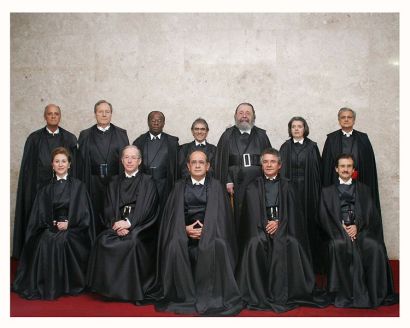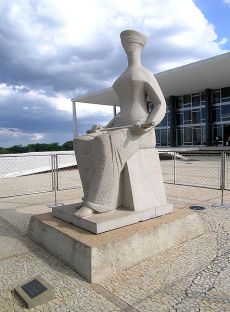
The 11-member Brazil
Supreme Federal Court: After a bruising
and very personal controversy over whether ex-President
Lula
da Silva pressured one of the justices to delay a trial over a vote-
buying scandal involving top members of his party, the author of
this article, Merval Pereira, suggests that America’s tradition of
keeping personal attacks on justices out of debates about their
decisions a
wiser course for Brazil to follow.
Brazil Should Follow
U.S. and Discourage Personal Attacks on Supreme Court Justices (O Globo, Brazil)
“In the United
States, institutional political actions against the justice system in
retaliation for judicial decisions are part of the game in the United States;
whereas actions regarding specific judges in the process of making specific
decisions - are not. The channels and effects of pressure are institutional - not
personal.”
By Merval
Pereira*

Translated By Brandi
Miller
July 10, 2012
Brazil
- O Globo - Original Article (Portuguese)
|

|
|
The sculpture in front of the Brazil Federal Supreme Court: This article from Brazil suggests that attacks on high court justices are getting too personal.
|
|
|
The United States Supreme Court is the judicial model on
which our Supreme Federal Court is based. And like it is here, the executive appoints
its judges. But there the Congress, which is always balanced between Republican
and Democratic parties, is more severe about approving nominations: former President
George W. Bush wasn’t able to get the approval of his attorney [Harriet Miers],
who, given the negative reaction that her nomination elicited, withdrew before
being subject to “advise and consent.”
Lyndon B. Johnson nominated his personal lawyer, Abe Fortas,
and then tried to make him chief justice - there, the president names the chief
justice, a lifelong appointment - but the Senate refused to approve him and
Fortas withdrew.
But more importantly, in the U.S., the position of all
justices are for life, which means that very few openings come up during the
eight-year tenure of a reelected president. Here, the age limit is 70, and the
system of public retirement encourages early retirement.
But whenever they can, with their nominations, presidents
try to sway the Supreme Court according to their own political creed.
In recent times, says Tomas Treba,
director of the Institute of Latin American Studies and the Center for
Brazilian Studies at Columbia University, there has been criticism of the
Court, which has been accused of being just another branch of the Republican
Party.
[Editor's Note: This article requires a little context for non-Brazilians. It appears that the author is concerned that in Brazil, the Supreme Federal Court is becomeing too politicized, and is looking toward the U.S. as a model for a less politicized hig h court. This may have to do with a scandal that has been simmering in Brazil since 2005. According to The New York Times: "Brazil’s political establishment is being shaken by a claim that Luiz Inácio Lula da Silva, the country’s most influential contemporary political leader, put pressure on a Supreme Federal Court justice to delay a trial over a vote-buying scandal involving senior members of the governing Workers Party. Justice Gilmar Mendes has asserted that Mr. da Silva, 66, asked him to postponethe trial, set for August. More than 30 politicians are implicated in the scandal referred to as the “mensalão” or “big allowance”; the nickname refers to the monthly payments said to have been made to legislators during Mr. da Silva’s presidency." The debate in Brazil over the case has veered from the merits of the case toward blistering personal atttacks against this and another justice, and numerous close advisors and allies of Mr. de Silva.]
h court. This may have to do with a scandal that has been simmering in Brazil since 2005. According to The New York Times: "Brazil’s political establishment is being shaken by a claim that Luiz Inácio Lula da Silva, the country’s most influential contemporary political leader, put pressure on a Supreme Federal Court justice to delay a trial over a vote-buying scandal involving senior members of the governing Workers Party. Justice Gilmar Mendes has asserted that Mr. da Silva, 66, asked him to postponethe trial, set for August. More than 30 politicians are implicated in the scandal referred to as the “mensalão” or “big allowance”; the nickname refers to the monthly payments said to have been made to legislators during Mr. da Silva’s presidency." The debate in Brazil over the case has veered from the merits of the case toward blistering personal atttacks against this and another justice, and numerous close advisors and allies of Mr. de Silva.]
Political scientist David Fleischer, an American expert
of Brazilian politics, recalls that in 2000, when the U.S. Supreme Court
ordered the state of Florida
to halt its vote recount for president, giving the victory to George W.
Bush, who was then able to win in the electoral college, two justices on the
Supreme Court should have recused themselves from the
case as their children were involved: one on the legal team defending Bush and
the other defending Al Gore. The American press was very harsh with its
criticism, but the two judges paid no attention.
Currently, the U.S. Supreme Court is to decide the
constitutionality of “Obamacare” - the mandatory
health plan Congress passed in 2009 - and President Obama has been heavily criticized for allegedly pressuring the Court
when, in an interview, he said he didn’t believe the justices would annul a law
approved by a majority of Congress.
A well-known recent case concerns Justice Antonin Scalia, one of the oldest and most conservative
justices on the Supreme Court, who was caught participating in a hunting outing
in the company of then-Vice President Dick Cheney, on whose official plane he
caught a ride.
As there was a case before the Court that directly involved
Cheney, Scalia’s participation in judging it was questioned.
Justice Scalia reacted by saying:
“Since I do not believe my impartiality can reasonably be questioned, I do not
think it would be proper for me to recuse ... someone who thought I could
decide this case impartially despite my friendship with the Vice President
would reasonably believe that I cannot decide it impartially because I went
hunting with that friend and accepted an invitation to fly there with him on a government
plane. [If it is reasonable to think that a Supreme Court Justice can be bought
so cheap, the nation is in deeper trouble than I had imagined].”
To summarize, criticizing the press that criticized him,
Scalia said that the issue wasn’t what an uninformed observer might think, but
what a well-informed observer would think. He added that at no time during the
trip was he alone with Cheney and that he paid for a round trip ticket to the
location of the outing, even though he only got a ride to the location. At no
time did the issue of ethics enter into his analyses.
Diego Werneck Arguelhes,
professor of law at the Getulio Vargas Foundation and an expert in the American
legal system, says that in its more than 200 years of constitutional history,
the United States has been a true laboratory for ways that politics can
pressure and even discipline the judiciary: cutting back on the Court’s powers,
suspending guarantee of habeas
corpus (as with Lincoln during the Civil War), constitutional amendments
“annulling” interpretations of the Constitution by the judiciary - and even a
case of impeachment (Samuel Chase
at the beginning of the 19th Century).
The example always brought up by those who study this is President
Franklin Delano Roosevelt’s attempt to change the composition of the Court.
Posted by Worldmeets.US
Reelected with great popular support, Roosevelt confronted
resistance from the Supreme Court, which declared several laws he had backed to
create social protections for workers unconstitutional. The Court, which had an ultra-liberal profile, considered them in violation
of the freedom to hire as stated in the Constitution.
[Editor’s Note: When the author says the Court had an “ultra-liberal”
profile, he is using a Latin-American definition of liberal – which relates to
adopting an extreme free-market driven point of view. Such free-market policies,
also known as “neo-liberal”
policies, have somewhat of a bad name in much of Latin America, particularly
sine the 2008 financial crisis. In the United States, the Court during the time
of Roosevelt would have been considered very conservative, and the president
more “liberal.”].
Roosevelt then sent a plan to Congress giving him the right
to appoint a new justice every time one of those on the bench turned 70 years
old, so as to boost his influence on the Court.
The plan was voted down, but the Supreme Court eventually gave
in and went on to validate the interventionist social legislation of the New Deal.
Professor Diego Werneck says that neither
are there many examples of challenges to particularly controversial decisions, particularly
in cases of racism. Several southern states initially refused to follow the decision
on Brown
vs. Board of Education (1954), which required White and Black children
to attend the same schools.
He defines as ‘bullies” major figures in American history who
took on the Supreme Court, such as Thomas Jefferson and Andrew Jackson, both
who had confrontations with Supreme Court Justice John Marshall.
According to Diego Werneck, there
is an essential difference between what happens here and in the United States:
institutional political actions against the justice system in retaliation for
judicial decisions are part of the game in the United States; whereas actions
regarding specific judges in the process of making specific decisions - are
not. The channels and effects of pressure are institutional - not personal.
*Merval Pereira is a Globo columnist and commentator on CBN
and Globo News. He is a member of the Brazilian
Academy of Letters and the Brazilian Academy of Philosophy. In 2009 he received
the Maria Moors Cabot prize from Columbia University for journalistic
excellence, the most important international prize. He is also a member of the
Board of Visitors of the John S. Knight Fellowships at Stanford University.
YOUR DONATION MAKES OUR WORK AS
A NON-PROFIT POSSIBLE. THANK YOU.